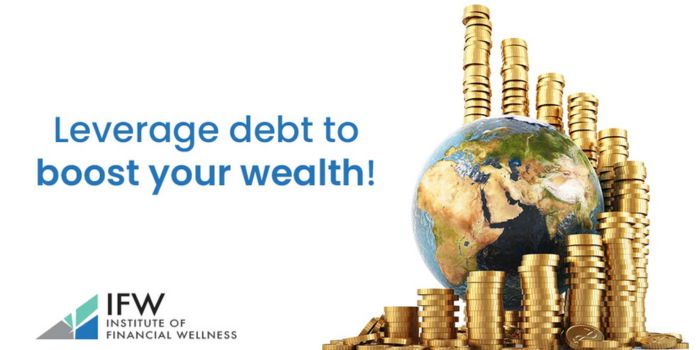“Wealth is not about having a lot of money; it’s about having a lot of options.” – Chris Rock
Welcome to a different approach to debt! Contrary to popular belief, when managed correctly, it can become an important factor in creating wealth. Are you ready for this mindset shift? Then, let’s explore how one can use debt as a tool for building wealth!
Key Takeaways
- Understand the difference between good and bad debt to leverage it successfully.
- Choose low-interest loan options, manage risk & reward, and adjust strategies regularly for effective debt management.
- Maximize tax benefits for various types of debts while maintaining a healthy credit score with timely payments & low utilization.
Understanding Good Debt vs. Bad Debt
Debt is only beneficial if it’s used properly. Good debt can generate significant value, may offer tax advantages, and could even elevate your credit score. Such as home loans or investments in long-term wealth growth opportunities like student loan programs. On the other hand, bad debt accumulates high-interest payments for items that lose their value quickly -such as consumables bought on a credit card – which has the potential to ruin financial futures without providing any returns at all. The key takeaway is to weigh whether borrowing will help build valuable assets or leave you with unnecessary liabilities before taking out any kind of loan.
How To Leverage Debt
By employing debt strategically, one must be meticulous in the decision of what type to select and how much risk-reward balance is desirable. This serves to generate capital growth that contributes positively towards strengthening our economic position long term, creating opportunities through leveraging debt that can secure a sound financial future.
Choosing the Right Type of Debt
When it comes to building wealth, the type of debt you take on and its associated interest rate should be a key factor in your decision-making. Investing time into researching low-interest loans can result in major savings compared to high-interest credit cards. Services like Forbes Advisor, NerdWallet, and Bankrate have viable options with reasonable monthly payments while MoneyLion offers tailored solutions based on individual financial circumstances, helping clear up existing debts so money is available for growth. Choosing lower-cost debt allows taking control of the financial trajectory just as choosing an easier path when traveling leads one faster towards their desired destination!
Managing Risk and Rewards
Managing debt in a way that balances risk and reward requires an understanding of one’s financial situation; investments should be diversified to limit potential losses. When investing or generating income with borrowed money in personal finance, it is essential to calculate the expected return by taking into account probabilities for different outcomes as well as managing your budgeting and cash flow diligently. Like not putting all your eggs in one basket, it is wise to incorporate various methods throughout this process, which can help reduce the risks associated with these activities and improve your credit score.
Monitoring and Adjusting Your Debt Strategy
Your debt strategy should be treated similarly to a garden that needs attention and alteration as needed for the best results. Developing an efficient method includes managing your budget, creating a savings plan for emergencies, and closely monitoring progress in reducing debt.
It’s wise to review this approach annually like you would have a physical check-up so it stays in line with your financial aspirations. Keep track of how changing conditions can affect such efforts. Rising interest rates or trouble paying back debts are warning signs alterations must take place immediately.
Smart Investment Strategies Using Debt

In order to progress, we need to progress. We must explore successful strategies for investing with debt in terms of real estate investments, stock market endeavors, and small business financing. Let’s chart our course!
Real Estate Investments
Debt investments in real estate can be beneficial, as leveraging debt has the same effect as lifting a heavy object by using a lever. It amplifies potential returns. For this reason, an investment loan could serve to strengthen rewards through investing money owed.
By getting financing for purchasing property, you are able to amplify your holdings and likely outcomes, similarly to how speaking loudly is amplified by means of a loudspeaker. Not only does rent provide steady passive income, but also paying off your mortgage gradually increases its equity value, which adds up to long-term wealth accumulation [1].
Stock Market Investing

Investing borrowed funds into the stock market could offer potential higher returns than normal. It is similar to adding extra fuel to a car’s engine. You can expect more speed, but it also increases risk. Taking out loans must be done with caution and proper investment strategies in place before attempting this kind of activity, as treading through the stock market without preparation would be like sailing on an open sea during storm season!
Small Business Financing
For a small business, taking on debt financing can be an advantageous move, provided there is a clear strategy and comprehensive market research. Choosing the right debt financial instrument depends on several considerations, such as interest rates, repayment schedules, and loan purpose. Effective financial planning for any size of organization requires not only prudence but also persistence in planning it out correctly over time. It’s akin to undertaking a journey with precise directions set before starting off!
Maximizing Tax Benefits of Debt
Exploring the potential tax deductions associated with debt can be likened to uncovering hidden treasure during a financial journey. Taking advantage of such savings opportunities, like mortgage interest, student loan interest, and business expenses, are all ideal ways to maximize these benefits.
Mortgage Interest Deductions
Debt can be made a little more bearable through the mortgage interest deduction, which allows individuals or married couples to subtract some of the paid interest on their mortgages from their taxable income. This has an effect similar to having a magical key for unlocking tax savings while attempting to build wealth with debt. A limit exists, however. The deductions are capped at $750,000 for single persons and $375,000 when filing taxes separately as husband and wife.
Student Loan Interest Deductions
Student loan interest deductions can act as a buffer, reducing your taxable income and thus cutting down on the tax you owe. It’s like uncovering an obscure shortcut in tackling financial matters.
To benefit from this deduction, those filing single must have a modified adjusted gross income of less than $85,000, while joint filers should be earning no more than $175,000, providing some relief for individuals struggling with student debt repayment obligations. This kind of reduction is useful to reduce financial stress – it’s practically part of any toolkit used to combat the pressures that come with loan payments!
Business Expense Deductions
Tax deductions are an invaluable asset in helping you reduce your taxable income. Examples include the mortgage interest and employee expenses incurred by a business. The Internal Revenue Service has specific criteria that must be met to qualify for these tax cuts, so consulting with a professional is highly recommended when claiming them. Most types of loan interest accrued on commercial endeavors can be deducted as well. Thus providing greater tax relief for those running businesses.
Tips for Maintaining a Healthy Debt-to-Income Ratio
Maintaining balance in a sea of debt, much like the steadiness needed to keep a ship afloat, can be achieved with proper financial planning and discipline. Aiming for your monthly debt payments not to exceed 36% of your gross income is important when it comes to preserving this equilibrium. Lowering expenses is similar to balancing one side on a scale and just as useful in setting yourself up for success along the journey toward wealth generation.
Building and Protecting Your Credit Score
Constructing and protecting your credit rating is similar to strengthening the masts of a sailing vessel. On-time payment of what you owe is critical, as it has an immense impact on your score.
Staying within low levels of utilization (using only some percentage from the total available) parallels staying far away from perilous reefs. Both are key aspects to consider when navigating safely. In this metaphor, checking one’s report frequently would be akin to a captain constantly monitoring their compass, guaranteeing that they remain heading towards success!
Financial Empowerment Unleashed: Your Guide to Success with the Institute of Financial Wellness
The Institute of Financial Wellness offers a range of financial support services to help people reach their money goals. Led by founder Erik Sussman, with over 26 years of experience in the field, we provide comprehensive education and guidance on debt management as well as wealth-building strategies for success. Our multi-media platforms provide both resources and planning tools so that individuals can journey towards financial well-being confidently. The Institute is there like your own personal guide – mapping out all steps required along the way until you’ve achieved complete fiscal satisfaction!
Full Summary
As you navigate this financial journey, it is important to note that with the right strategies and guidance, debt can be utilized as a way of building wealth and safeguarding your future. Consider keeping track of good vs bad debts while properly utilizing leveraging tactics so as not to cause any disruption in terms of income versus spending. By investing wisely now through such methods, we are likely able to reap tax benefits down the road for greater monetary gain overall.
Frequently Asked Questions
How can debt be used to generate wealth?
By utilizing debt, money can be borrowed and put towards assets such as property or shares with the potential for creating wealth. This is what’s known as ‘gearing’. The value of these investments should increase over time, providing greater income and capital growth than would have been spent servicing the loan.
Is it better to build wealth or pay off debt?
Paying off any debt that is accompanied by high interest rates should take precedence over making extra investments toward retirement. By doing this, the amount of total interest paid will be lessened, and you’ll get a better return on your money than most other forms of investment. This also offers relief to your budget as an additional benefit!
What is a healthy debt-to-income ratio?
It is essential for a solid financial standing that one has an adequate debt-to-income ratio, which Indicates no more than 36% of their total gross monthly income should be spent on existing debts [2].
What are the benefits of financing a small business with debt?
Debt financing of a small business can provide many advantages, for example, keeping complete oversight and the right to make decisions, as well as making it possible to claim tax reductions on interest payments [3].
What are the tax advantages of incurring debt?
Debt can be advantageous from a tax standpoint since business costs like interest fees are eligible for deductions in order to reduce taxable income.




